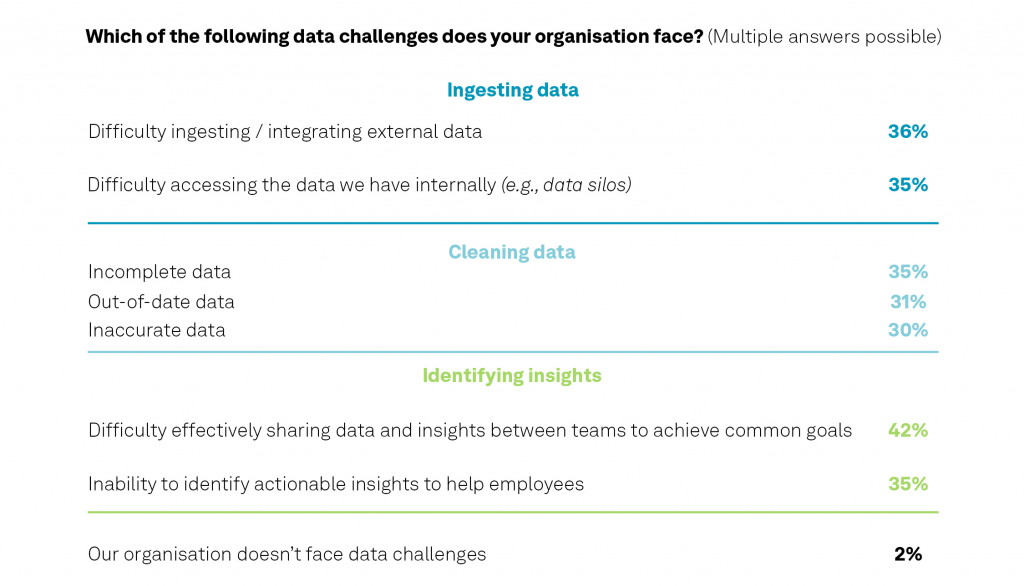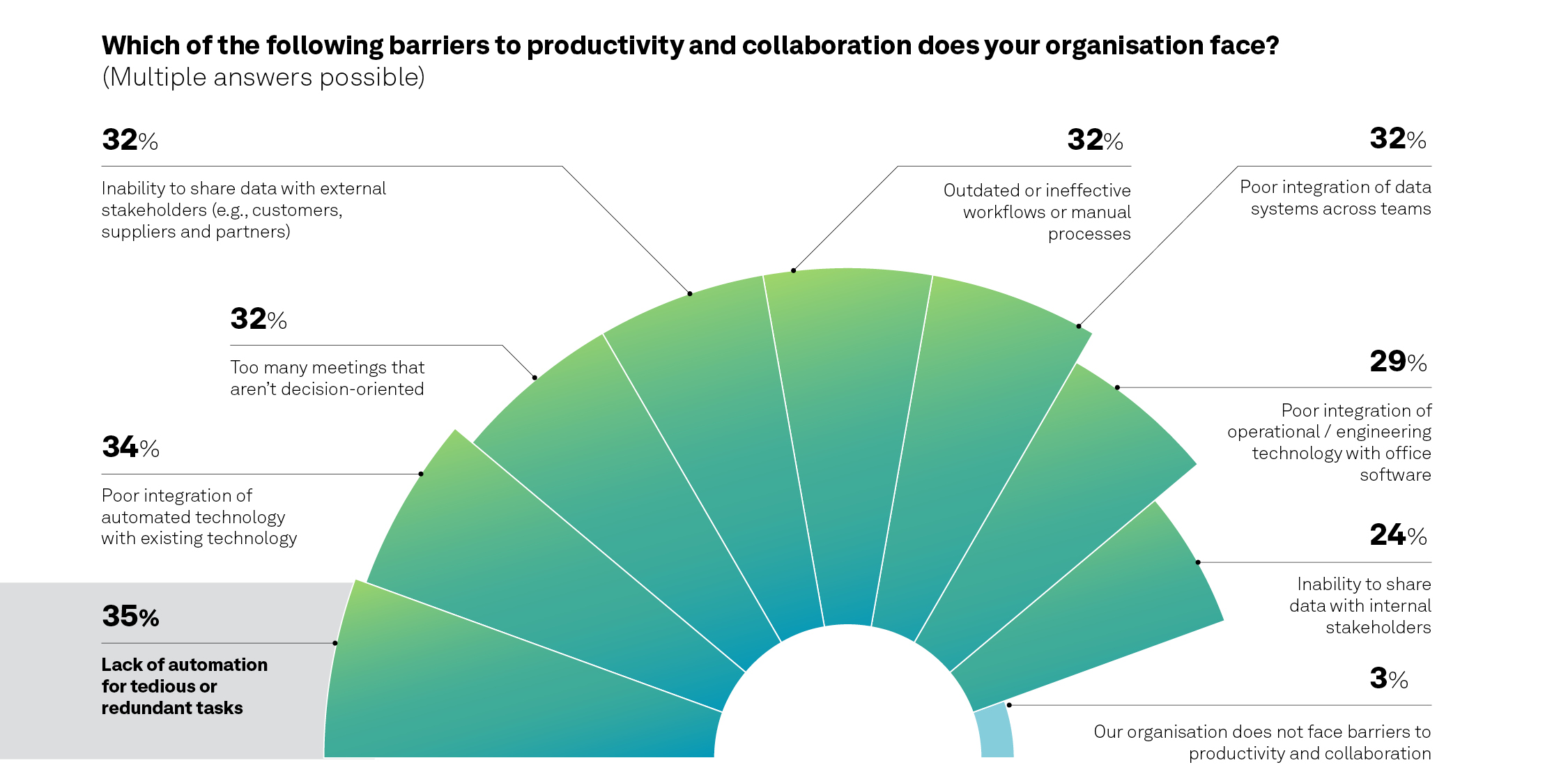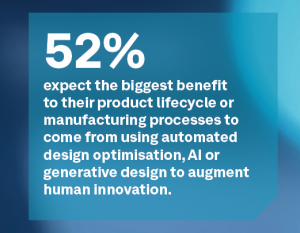At a glance
- The Advanced Manufacturing Report highlights data, collaboration and automation as key enablers of change within the industry.
- Effective data management, cross-functional collaboration and intelligent use of automation can drive efficiency and innovation.
- As automation evolves, generative AI could add unprecedented value across industries, emphasising the need for refined data management practices.
The manufacturing industry often sets the trends for technology adoption in industrial settings. For example, the automation journey began a half-century ago with the first industrial robot — a 2,700-pound behemoth Unimate prototype — installed in a GM factory in 1959. Since then, robotics technology has significantly evolved and expanded beyond traditional manufacturing. Today, robots are integral to various industries, undertaking tasks like automated bricklaying in construction, efficient goods handling in logistics and warehousing and critical functions such as dispensing medication within hospitals.
Every industry faces unique challenges, yet all can benefit from manufacturing’s approach to data, collaboration and automation. The Advanced Manufacturing Report, a commissioned study conducted by Forrester Consulting on behalf of Hexagon, offers critical insights that can guide various sectors through their digital transformation journey.
You’re not alone in your data struggles
In 2006, British mathematician Clive Humby declared that data is “the new oil”. When effectively refined and processed, it can propel businesses toward greater efficiency and innovation. This has been proven true: the full potential of raw data is realised only when it is accurate, complete, integrated and actionable.
However, the survey revealed that 98% of manufacturing organisations face challenges with their data, notably in sharing it among teams to achieve common goals.
This issue is not confined to manufacturing alone. A simple Google search on “common data challenges for businesses” returns about 1.89 billion results, highlighting the widespread nature of data-related issues.
The construction industry, for example, recognises its data challenges and is actively working to bridge the data leverage gap. It’s reported that commercial construction projects generate an average of 197 million assets. Efficiently collecting, storing, organising and analysing data enhances project management and ensures projects are completed on schedule, within specifications and on budget. To achieve this, many firms are turning to digital solutions such as Building Information Modelling (BIM) and advanced software that facilitates seamless communication from office to field, offering real-time insights that improve project outcomes.
Overcoming data silos, enhancing data access and pulling valuable insights from data is crucial. It paves the way for better collaboration and drives business outcomes, such as higher quality and sustainability.
Automate your way out of collaboration challenges
Once confined to the traditional face-to-face collaboration model, industry has moved beyond those limits. Advanced technologies, globalisation and remote working trends have impacted many businesses, making proximity no longer essential for collaboration.
However, effective collaboration still faces obstacles in many industries. In manufacturing, issues such as misaligned project goals, production delays and resource wastage often stem from siloed departments lacking a shared purpose. This fragmentation leads to inefficiencies that could be avoided with a unified vision and the implementation of digital collaboration tools across project teams.
Open collaboration platforms solve these challenges by enabling real-time collaboration and feedback across different software environments to accelerate innovation. Automation is another solution. 35% of manufacturing leaders believe that a lack of automation for tedious or redundant tasks is a barrier to productivity and collaboration.
The finance sector demonstrates how automation extends beyond manufacturing to enhance collaboration and streamline operations. In banking, automation improves efficiency, particularly in mortgage origination, allowing employees to focus on higher-value tasks. Automating tasks reduces the traditional mortgage process from 46 days to fewer days, cutting costs and enhancing communication. Integrated portals and collaboration technologies like chatbots and real-time updates facilitate smoother customer interactions and more effective workflow management, speeding up the mortgage lifecycle and enriching the customer experience.
Transitioning from isolated tasks to a collective team effort boosts productivity, fosters creativity and improves business outcomes. With available technologies, including automation, organisations can dismantle silos and enhance communication, significantly improving their impact.
Data organisation is crucial in leveraging automation and artificial intelligence (AI)
Automation is reshaping the landscape across all fields. As AI and machine learning become more integrated into our systems, they enhance performance, fill skill gaps and augment our capabilities.
The Advanced Manufacturing Report bears this out. The research found that 52% of manufacturing leaders expect to benefit most from automated design optimisation, AI or generative design to augment human innovation.
Generative AI will play a particularly critical role across industries beyond manufacturing; Forrester estimates that AI could add $2.6 trillion to $4.4 trillion in annual economic benefits across 63 use cases.
Customer operations greatly benefit from generative AI, which enhances both customer experience and agent productivity. By automating customer interactions using natural language processing, generative AI handles inquiries with greater efficiency and accuracy.
For instance, in one case study, generative AI improved issue resolution by 14% per hour and reduced handling time by 9% while cutting agent attrition and managerial requests by 25%. AI particularly benefits less-experienced agents, helping them to communicate at levels similar to their more skilled peers. This demonstrates generative AI’s pivotal role in leveraging data to drive innovation and operational improvements across various industries.
Of course, realising those benefits circles back to the importance of overcoming data challenges. As McKinsey’s article, The Data Dividend: Fueling Generative AI, points out, “Your data and its underlying foundations are the determining factors to what’s possible with generative AI” — emphasising the urgency of refining data management practices today to ensure future benefits.
Three takeaways to transform your industry
As industries evolve, adapting to new technologies and methodologies becomes critical. Here are three key takeaways that can significantly transform any sector:
- Data mastery: Achieving precision in data management is a cornerstone for unlocking innovation and efficiency, setting the stage for future advancements.
- Collaborative environments: Cultivating partnerships within and across teams is essential for navigating the complexities of modern industries and enhancing problem-solving and creativity.
- Automation as a catalyst: Leveraging automation empowers organisations to streamline operations and foster growth, preparing them to lead in an innovation-driven landscape.
By embracing these principles, you can position your organisation for success and embark on a path of continual advancement. These insights are not limited to manufacturing; they pave the way for progress in every field.
For a deeper understanding and further exploration of these concepts, read the Advanced Manufacturing Report.






















